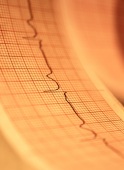
FRIDAY, March 9 (HealthDay News) — Each year, between one and six of every 100,000 U.S. children are a victim of sudden cardiac death. In many of these cases, underlying, undiagnosed heart trouble is responsible, and a new study suggests that routine mass electrocardiogram (EKG) screening could help identify these problems earlier, and potentially save children’s lives.
Although EKG exams, which record electrical activity in the heart, could help identify these heart problems, many questions remain about how and when to use them.
Researchers from Tufts Medical Center, Harvard Medical School and Children’s Hospital Boston analyzed data from 30 studies, which examined subgroups of children such as newborns and high school athletes. The results appear online and in the April issue of Pediatrics.
The goal of the study was to see how accurate EKG was at identifying three of the most common disorders associated with sudden cardiac death: hypertrophic cardiomyopathy (a thickened heart muscle), long QT syndrome (a rare congenital disorder) and Wolff-Parkinson-White syndrome (a condition that can lead to very rapid heart rate).
By and large, EKGs were accurate at identifying these three conditions, but there was a risk of false positives in some cases.
“EKG is going to find disease; this is undisputed. But we will never find all the diseases that we worry about because not all things are detectable on EKG,” said study author Angie Mae Rodday of Tufts Medical Center in Boston. “Some of these heart problems are very age dependent, so even if you are going to develop it as you get older, an EKG may not have any findings.”
Study co-author Dr. Laurel Leslie, an associate professor of pediatrics and medicine at Tufts University, agreed. “There are, unfortunately, [heart problems] that aren’t identified by any of these approaches, which is tragic, but thankfully quite rare,” she said.
Rodday’s advice for concerned parents is to “work with [your] pediatrician and be aware of family history.”
“A number of these disorders are genetic,” she said. “Family history is not your Uncle Fred who had a heart attack at age 75. We are talking about disorders where someone died of a cardiac problem before the age of 50.”
Dr. Rubin Cooper, chief of pediatric cardiology at Cohen Children’s Medical Center in New Hyde Park, N.Y., said the proper timing of an EKG as a screening test is an issue. EKG readings change in the first few weeks and years of life.
“We are between a rock and a hard place because we don’t want to give people a false sense of security,” Cooper said. “A normal EKG reading may not mean they are not at risk for sudden cardiac death in the future.”
It is too soon to offer blanket screenings for all kids, Cooper said. “We need some sort of filter, such as a pediatrician or family practitioner, to identify the family history very accurately and conduct a physical exam,” he said.
Children who develop chest pain or shortness of breath during exertion, however, may need further evaluation by EKG, Leslie said.
More information
Learn more about sudden cardiac death at the U.S. National Heart, Lung, and Blood Institute.

